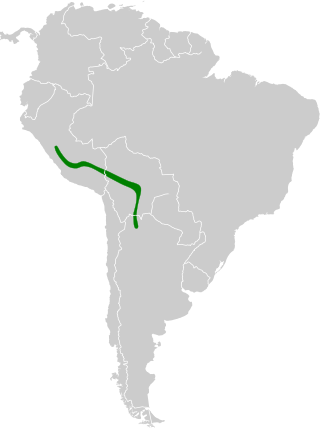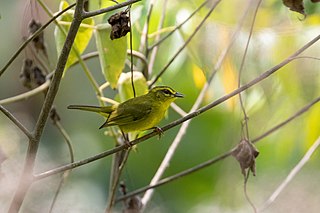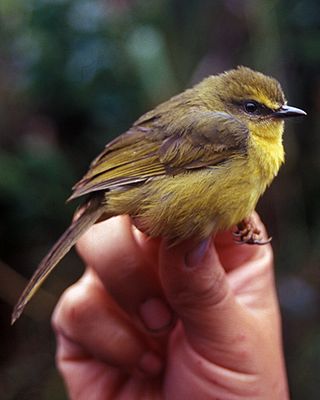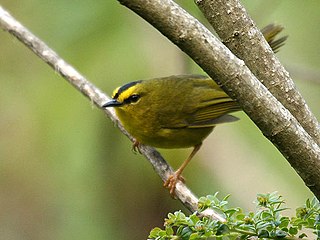
The black-and-white warbler is a species of New World warbler, and the only member of its genus, Mniotilta. It breeds in northern and eastern North America and winters in Florida, Central America, and the West Indies down to Peru. This species is a very rare vagrant to western Europe.

The elfin woods warbler is a species of bird endemic to Puerto Rico, where it is local and uncommon. Discovered in 1968 and described in 1972, it is the most recently described New World warbler.

The buff-rumped warbler is a New World warbler that is resident from Honduras south to northwestern Peru and disjunctly in the western Amazon. It is found in forests at up to 1500 m altitude, always near water.

The pale-legged warbler is a species of bird in the family Parulidae. It is native to Argentina, Bolivia, Colombia and Peru. Its habitats include subtropical or tropical moist montane, as well as subtropical or tropical heavily degraded former forest.

The Santa Marta warbler is a species of bird in the family Parulidae. It is endemic to the Santa Marta Mountains in Colombia.

The two-banded warbler is a species of bird in the family Parulidae. It is found in Argentina, Bolivia, Brazil, Guyana, Peru, and Venezuela. Its natural habitats are subtropical or tropical moist montane forests and heavily degraded former forest.

The Cuzco warbler is a South American species of bird in the family Parulidae. Its natural habitats are subtropical or tropical moist lowland forests, subtropical or tropical moist montane forests, and heavily degraded former forest. The bird was split from the golden-bellied warbler.

The grey-throated warbler is a species of bird in the family Parulidae.

The white-lored warbler is a species of bird in the family Parulidae. It is endemic to the Santa Marta Mountains in Colombia.

The russet-crowned warbler is a species of bird in the family Parulidae. It is found in Bolivia, Colombia, Ecuador, Peru, and Venezuela. Its natural habitats are subtropical or tropical moist montane forests and heavily degraded former forest.

The flavescent warbler is a species of bird in the family Parulidae. Its name comes from flavescent, a yellowish colour. It is found in Argentina, Bolivia, Brazil, Colombia, Guyana, Paraguay, and Venezuela. Its natural habitats are subtropical or tropical dry forest and subtropical or tropical moist lowland forest.

The grey-and-gold warbler is a species of bird in the family Parulidae. It is found in Ecuador and Peru. Its natural habitats are subtropical or tropical dry forests and subtropical or tropical moist lowland forests. Aspects of the grey-and-gold warbler's breeding biology were recently described by Miller et al. (2007), based on a sample of two nests. It was named after British zoologist and collector Louis Fraser.

The grey-headed warbler is a species of bird in the family Parulidae. It is endemic to Venezuela.

The white-rimmed warbler or white-browed warbler is a species of bird in the family Parulidae. It is found in Argentina, Brazil, Paraguay, and Uruguay. Its natural habitats are subtropical or tropical moist lowland forests, subtropical or tropical moist montane forests, subtropical or tropical moist shrubland, and heavily degraded former forest.

The white-striped warbler is a species of bird in the family Parulidae. It is endemic to Brazil.

The citrine warbler is a species of bird in the family Parulidae. The term citrine refers to its yellowish colouration. It is found in Bolivia, Colombia, Ecuador, Peru, and Venezuela. Its natural habitat is subtropical or tropical moist montane forests.

The black-crested warbler is a species of bird in the family Parulidae. It is found in Colombia, Ecuador, Peru, and Venezuela. Its natural habitats are subtropical or tropical moist montane forests and heavily degraded former forest.

The Choco warbler is a South American species of bird in the family Parulidae. Its natural habitats are subtropical or tropical moist lowland forests, subtropical or tropical moist montane forests, and heavily degraded former forest. The bird was split from the golden-bellied warbler.

Myiothlypis is a genus of New World warblers, best represented in Central and South America. This is one of only two warbler genera that are well represented in the latter continent. All of these species were formerly placed in the genus Basileuterus.

The Roraiman warbler is a species of passerine bird in the new world warbler family Parulidae. It is known to associate with Tepui rainforest ecosystems and is found in southern Venezuela, western Guyana, and adjacent areas of northern Brazil. The bird has been periodically granted full species status, although it has also been occasionally considered a subspecies of two-banded warbler. Based on the population's physically disparate distance from the nominate species, vocal differences, and slight differences in plumage, several authorities consider the Roraiman warbler independent. Recent genetic evidence also indicates the birds of northern South America are significantly diverged from the two-banded warbler populations in the Andes.





















